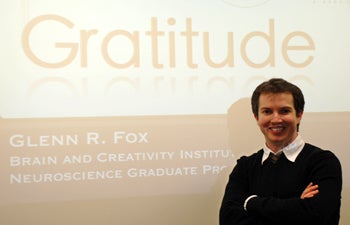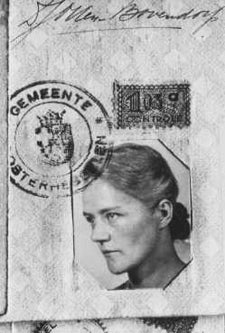From the Bottom of My Heart
Put yourself in the position of a Jew during World War II who escapes to France penniless and is forced to beg on the streets. A passerby gives you roasted peanuts — your first morsel of food in several days.
You are allergic to peanuts.
Do you feel grateful? Or bitter, anxious, awkward, sad — perhaps even happy?
The scenario and question are part of Glenn Fox’s dissertation research on gratitude — the first probe into the emotion of gratitude using functional magnetic resonance imaging. Fox is a fifth-year Ph.D. student in neuroscience, studying under the guidance of Antonio Damasio, University Professor and David Dornsife Chair in Neuroscience and professor of psychology and neurology. Fox is utilizing the USC Shoah Foundation Institute’s videotaped testimonies of survivors and other witnesses of the Holocaust.

Fox, a fifth-year Ph.D. student in neuroscience in USC Dornsife, is utilizing the USC Shoah Foundation Institute’s videotaped testimonies of survivors and other witnesses of the Holocaust in his research on gratitude. Photo by Pamela J. Johnson.
Fox’s research has earned him the Irving and Jeanne Glovin Award, given by the Oskar Schindler Humanities Foundation. The yearly award provides funding to one or two graduate students who produce research related to the nature of good human conduct. According to the foundation, the spirit behind the award is illustrated by the words of Confucius: “Do not do unto others what you would not have them do unto you.”
“This award means everything to the project,” Fox said, adding that it will enable his team of undergraduate researchers to involve more participants and afford equipment and software to make the project possible.
“It also means everything in a more profound way: the award shows that we are not alone in our desire to understand and promote good human conduct.”
Fox’s studies so far indicate that gratitude lives at the center of good human conduct and serves as a fulcrum by which people seek to do right by others. When one is the beneficiary of good human conduct, one experiences a concert of positive emotions ranging from relief to elation, Fox said. These emotions can in turn motivate people to expend great sums of energy to reward those near the source of the good conduct, creating, literally, a virtuous cycle.
“There is something very real about the phrase; ‘Pay it forward,’ ” Fox said. “Gratitude is a powerful emotion.”
The gratitude study blends the sciences with the humanities, a goal of the Brain and Creativity Institute, housed in USC Dornsife and directed by Damasio. From the humanities, Fox and his researchers are learning how it may have felt to be involved in the Holocaust. They are bearing witness to what happened through others’ accounts in a way that draws researchers closer to the tragedy itself. Science complements this by providing a mechanistic, empirical understanding of how these processes emerge in the body.
“We can look at an example such as being allergic to peanuts, and map in the brain how a group of people or even one person may react to that gift,” Fox said. “Some people would see this as still a nice gesture and still feel gratitude; others may become bitter at receiving a gift that is useless in practical terms. By examining how the brain becomes active in a scenario when someone feels bitter, compared to feeling grateful, we can see what brain regions are part of the neural concert underlying these experiences.”
Fox and his team spent hundreds of hours watching and listening to many of the more than 52,000 testimonials from the USC Shoah Foundation Instituted Visual History Archive housed in USC Dornsife. They collected scenarios in which a survivor receives some sort of gift. Gifts as described in the scenario above might elicit mixed feelings. Other gifts — for example when a prisoner whispers “stay left,” to someone exiting a train at Auschwitz, saving his life when all those on the right are sent to a gas chamber — may bring out deep gratitude.

Identity photo of Dirke Otten, who gave her identity card to a Jew in order to save her. Otten and her husband hid as many as 50 Jews in their home at one time. Nieuwlande, the Netherlands, date uncertain. USC Dornsife’s Glenn Fox draws from Holocaust scenarios in his research on gratitude. Copyright © United States Holocaust Memorial Museum, Washington, D.C./Gay Block and Malka Drucker.
In their studies, participants are asked to take the perspective of the survivor and read about his or her personal experiences while connected to a brain scanner. Participants also fill out a questionnaire describing their emotions.
“Our preliminary data shows that gifts eliciting near unspeakable gratitude — for example, being given shelter and food when there is a great personal risk to the giver for doing so — elicit brain regions associated with happiness, social bonding and joy,” Fox said.
Until now, studies on gratitude and its importance to humanity have largely been confined to the philosophical and humanist traditions, Fox said. Empirical investigations of gratitude are rare. This likely stems from the fact that systematically identifying the thoughts, feelings and behaviors associated with gratitude requires hitting a moving target: similar people experiencing similar exchanges may often form dramatically different reactions.
“This complexity can serve as an intimidation factor for researchers,” Fox said. “Or it can serve as inspiration, creating an impetus for paradigms capable of probing this crucial element of our lives. Here, we target the latter.”
It is generally known that gifts capable of creating a feeling of gratitude fulfill two criteria: they come as a result of a large amount of perceived effort from the giver, and they fulfill some need for the recipient.
For example, imagine a person receiving a bodily organ from a family member. That scenario describes some of the behavioral foundations of gratitude, but until now no substantive research had been conducted using the powerful tools now available to neuroscientists.
“Before our project, not a single study had been done to directly illuminate gratitude at the physiological level through functional magnetic resonance imaging,” Fox said.
As Fox predicted, the brain activity accompanying the feeling of gratitude encompasses areas of the brain known for feeling happiness and interpersonal bonding. This brain activity forms the neural underpinnings of good human conduct. The preliminary data is among the first and only to reveal the concert of neural activity associated with gratitude.
“If there is an emotion capable of promoting good human conduct and respect among people,” Fox said, “that emotion is gratitude.”